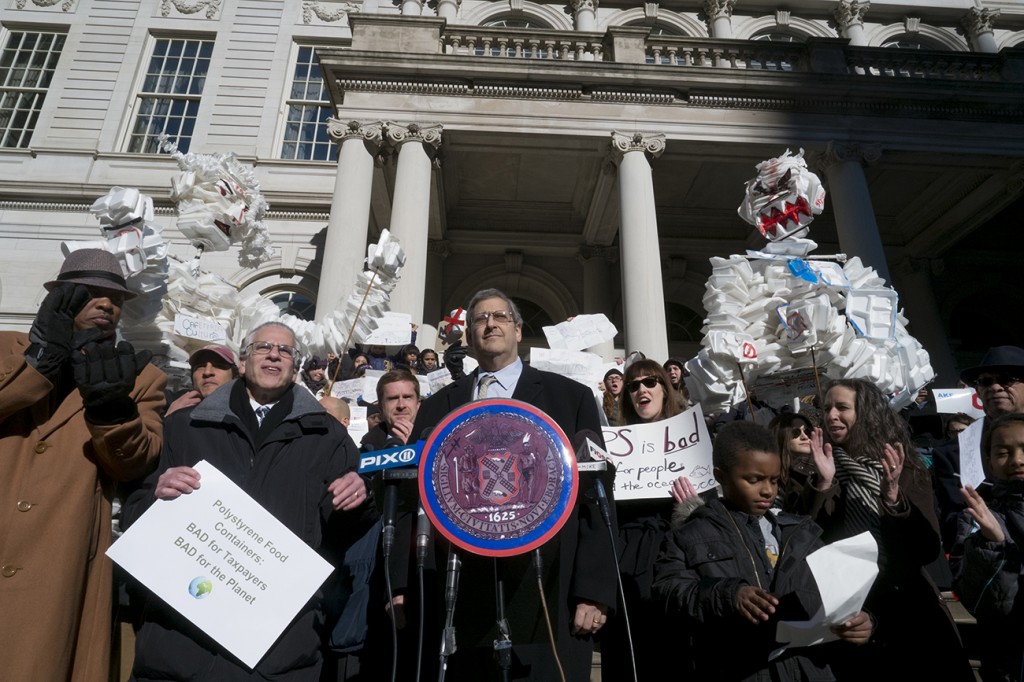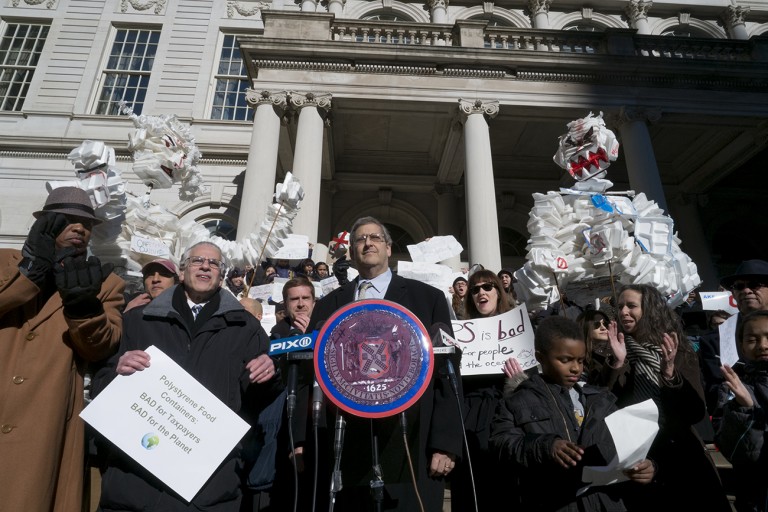
Councilman Lew Fidler, center, and others rallied earlier this month in support of a bill that the Brooklyn legislator introduced, and which was passed by the Council last week, that will ban the sale of polystyrene cups and food takeout containers. Photo Courtesy William Alatriste/NYC Council
In the City Council’s final marathon session of the year last week, during which outgoing legislators waxed nostalgic for tenures on the verge of ending, members pushed through a last-minute flurry of 26 bills, including two that Mayor Bloomberg feted as continuing to shape New York City into “the most sustainable city in the world.”
Legislation that will restrict the sale on single service food items packaged in polystyrene foam – commonly referred to as Styrofoam – passed the Council by a vote of 51-0. Intro 1060-A, which was sponsored by Councilman Lew Fidler (D-Brooklyn) and backed by the Bloomberg administration, is slated to outlaw polystyrene foam coffee cups and food takeout containers – items that, numerous legislators noted, can sit in landfills for hundreds of years.
The bill, which, in addition to Fidler, had 23 sponsors, will prohibit restaurants, coffee shops and food stands from using polystyrene foam food and beverage containers after July 1, 2015 – a move that follows in the footsteps of nearly 100 other cities and towns across the country that have outlawed the foam product. As part of the legislation, the polystyrene industry, which sunk millions of dollars into fighting the ban, will have until Jan. 1, 2015 to prove that the material can be recycled. At that time, the city’s sanitation commissioner will determine whether or not the single service items can, as the bill’s language states, be recycled “in a manner that is environmentally effective, economically feasible, and safe for employees.”
In response to concerns from the small business community, the legislation will permit nonprofits and businesses earning less than $500,000 annually to apply for a financial hardship waiver that would allow them to continue using the single-service polystyrene foam items. Additionally, no establishment will be fined for violations of the law before January 2016 and instead will only receive warnings and multi-lingual information on where to obtain non-polystyrene foam packaging.
“After the months of discussion and debate surrounding this bill I can unequivocally say two things: First, is that everyone, on every side of the issue, is now in agreement that foam food service items in our waste stream are a real problem and must be dealt with,” Fidler said. “They are a pollutant in our environment and a contaminant in our current recycling programs. I am immensely proud of our success in raising this issue and shaping that debate. Second, we have amended this bill to be both flexible and more responsive to our local business community, while not compromising on its core concepts. That is an achievement by any standard.”
Fidler went on to say that, “with this bill we can move into the future.”
“The technologies and the materials of the past will not hold us back from doing so,” he said. “They have said that the only things that will survive us all will be Styrofoam and the cockroaches. Now it will just be the cockroaches.”
Long an advocate of banning the foam products that frequently clog gutters and waterways, as well as, of course, landfills, Bloomberg praised the ban.
“This legislation not only eliminates a product that cannot be recycled in New York City, it is a giant step forward in the City’s efforts to recycle organic waste,” Bloomberg said. “Foam pollutes the waste stream, making it harder to recycle food waste, as well as metal glass and plastic. Once the ban takes effect, it will be much easier and more economical to collect and separate recyclables. I would like to thank Council Speaker Christine Quinn, Council Member Lew Fidler, and the entire City Council for working with us to get this done.”
Another bill that was passed, Intro 1162-A, will require the city’s largest food waste generators to separate food waste to ensure it does not go into landfills. The legislation was introduced by Councilwoman and Public Advocate-elect Letitia James and sponsored by Queens Council Members Eric Ulrich (R-Ozone Park), Mark Weprin (D-Little Neck), Jimmy Van Bramer (D-Sunnyside), and Peter Koo (D-Flushing), among others.
“Today’s City Council vote is a significant step towards our PlaNYC goal of diverting more waste from landfills,” Bloomberg said in reference to his administration’s push to make the city more environmentally friendly. “Over the past few years we have launched a variety of recycling efforts, including the food waste challenge, through which city restaurants and institutions have already recycled 2,500 tons of organic waste. New York City’s food industry has led the way in this effort, and I want to thank them for working with us to reach this milestone.”
The Council also greenlighted a bill that bans smoking e-cigarattes at bars, restaurants and workplaces. The legislation, sponsored by Quinn and Councilman James Gennaro (D-Fresh Meadows), will help to deter people from smoking in public spaces, where the legislators argued it could send the wrong message to children that puffing on cigarettes is a safe practice.
The two legislators said in a joint statement that, “we all know that smoking is a particularly difficult habit to kick.
“Allowing smokers an easy way to maintain their nicotine intake indoors can make quitting even harder,” Quinn and Gennaro continued.
By Samantha Geary

